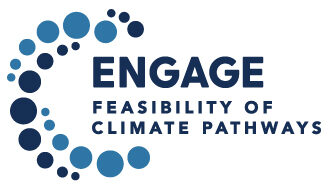ENGAGE Stakeholder Dialogue (EU)
October 18, 2022
Finally, after almost two years of online meetings, the ENGAGE project organized a face-to-face stakeholder dialogue. Hosted by PBL in the Hague, the meeting was attended by 23 stakeholders (of which four joined online) and supported by 10 members of the project team for a total of 37 participants.

In an opening warm-up round, participants were asked to briefly voice their expectations for the upcoming UNFCCC Conference of Parties in Egypt. Many said that they had low expectations and others expressed their hopes for raising ambition and real commitments, a focus on climate justice, getting major emitters on board and science remaining the guiding force.
The first session focused on the current hot topic of Energy Security. Alessia de Vita (E3 Modelling) presented results of modelling the RePowerEU strategy, comparing the results with a reference scenario (2019) and the Fit for 55 (2021) strategy. The participants then discussed the results that were presented, emphasizing topics such as the need to accelerate the supply of renewable energy and to reduce demand through efficiency measures in a circular economy, the different starting points in EU countries and the implications of demand for materials from outside the EU. A common topic across the groups was the risk that short-term strategies would not be aligned with long-term goals and the challenge to improve energy security while also decarbonizing. The importance of behavioural change and also of avoiding lock-in effects with a switch to liquid natural gas in the short-term were also common across discussion groups.
The second session focused on an ongoing stream of work in the ENGAGE project: to develop a website and data dashboard, the Climate Solutions Explorer (CSE). The website will enable visualization and comparison of spatial climate impacts data. The National Dashboard pages are designed to enable comparison of mitigation pathways and (avoided) climate impacts. The Net Zero Stories section of the website will include analysis of trade-offs, co-benefits and avoided impacts from the ENGAGE national modelling partners. These stories highlight national perspectives on the pathways to net-zero and discuss important co-benefits and trade-offs for key sectors such as air pollution & health, water, energy security, and land & biodiversity. Ed Byers (IIASA) presented the current status of the CSE to get feedback on the design and content. The participants showed strong interest in this tool for disseminating results from the ENGAGE project and provided a large number of ideas both for enhancing the functionality of the website and also the qualitative and quantitative content. The participants emphasized that the language used should be accessible to a broad range of potential users. They suggested that the use of narratives is attractive and that more stories could be added. It will be important, according to the stakeholders, to provide more examples of the benefits of climate change mitigation, while ensuring that the messages conveyed are consistent across the platform. This input from stakeholders comes just at the right time in the development of the CSE!
In the final session, the meeting turned to the topic of effort sharing. Zoi Vrontisi (E3 Modelling) presented results from the ENGAGE project based on including different effort-sharing mechanisms in integrated assessment models. The modelling results show that if the goal is to keep the global temperature increase below 2oC, there is little difference in terms of GDP impacts between a cost-optimal solution and other effort-sharing mechanisms. This was followed by a short presentation prepared by Silvia Pianta (CMCC) on the results of surveys on preferences for the different effort-sharing mechanisms carried out online and during several stakeholder workshops in the ENGAGE project. The group discussions after the presentations focused on issues and questions raised by the first presentation. One group discussed new ideas for effort sharing. These included: go beyond a monetary (GDP) and nation-based approach to look at social and environmental capital; effort sharing should focus on private corporations; and a per capita based approach in which the effort is made by the rich. Another group discussed the projected costs of effort sharing, noting that the cost calculations should also include the co-benefits, such as reduction of air pollution or increase of employment and that the choice of reference scenario matters when costs of effort sharing are calculated. A third group discussed the short-term feasibility of implementing effort sharing mechanisms, pointing out that it is important to consider “feasibility for whom?” In the short term, coalitions could be a feasible way forward and in the private sector there could be opportunities for effort sharing.
After an intensive day of presentations and discussions, Bas van Ruijven (IIASA) closed the meeting by thanking all participants for the very productive meeting that will without question inspire further work in the last year of the ENGAGE project.

